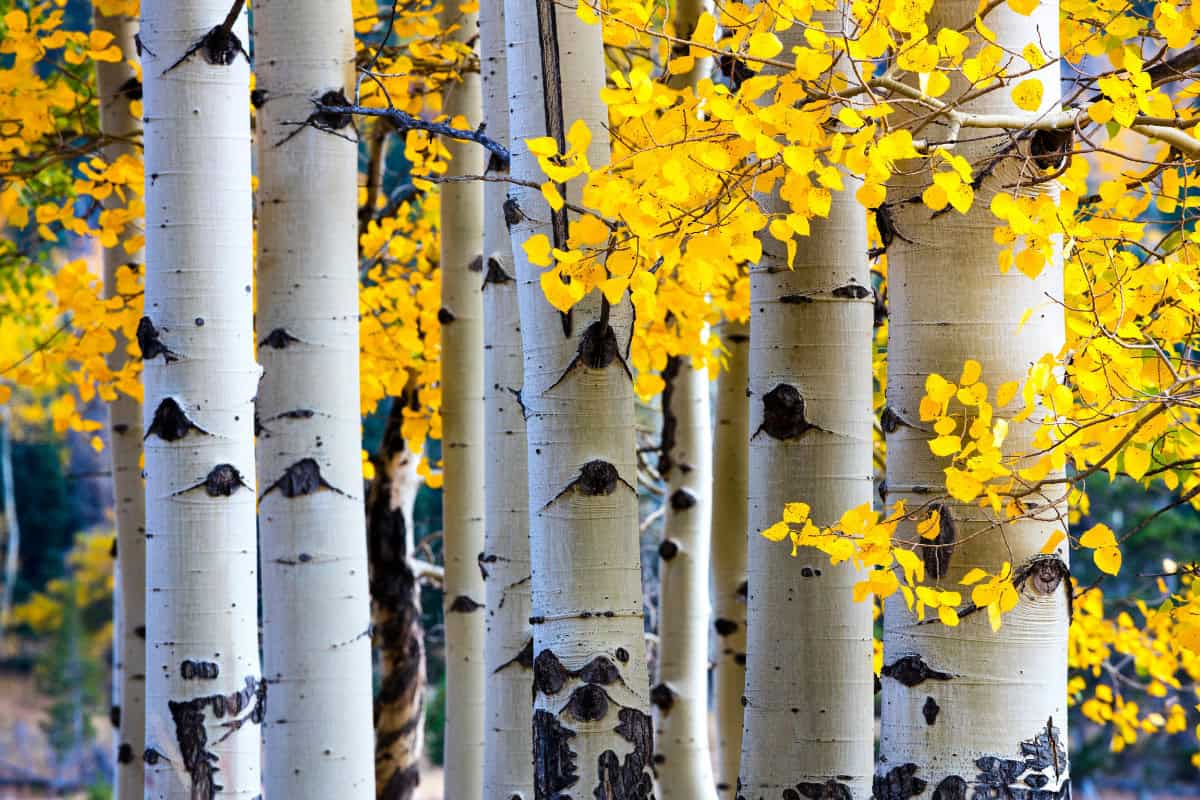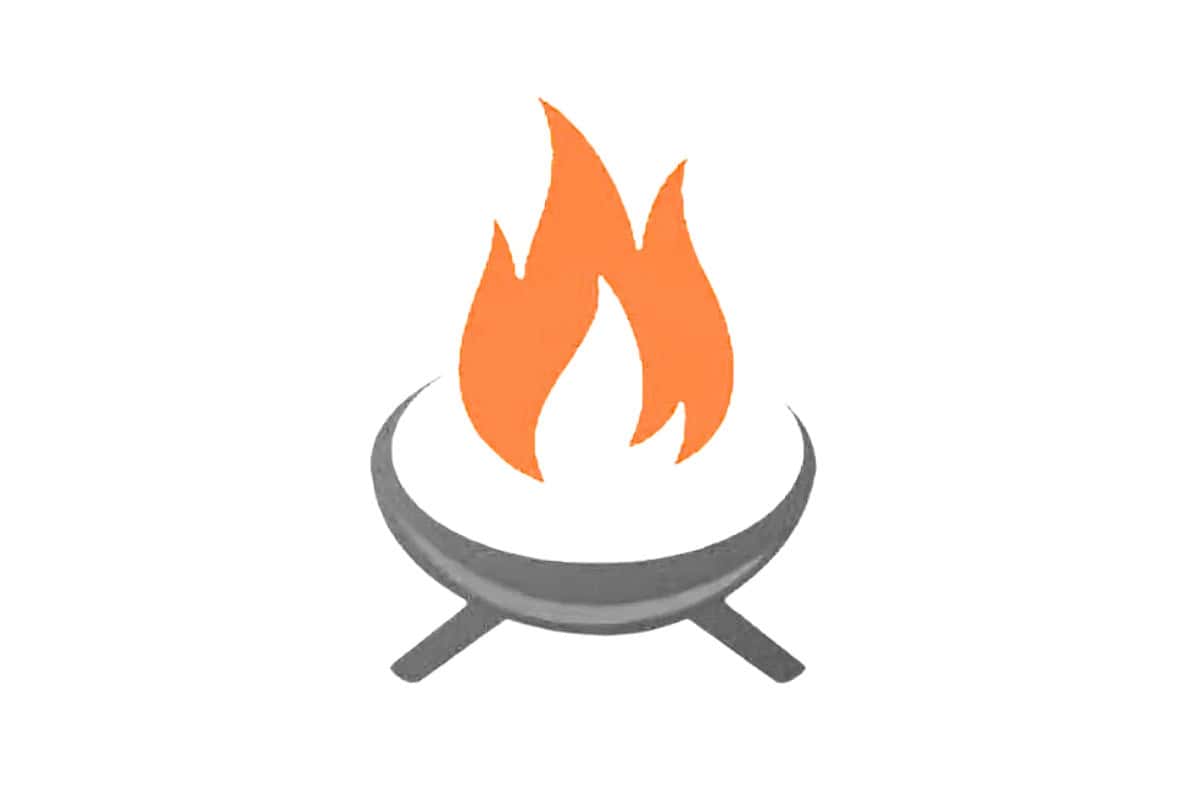
This comprehensive Aspen firewood profile explores the trembling giant of northern forests, delivering 12,000-15,000 BTUs per cord with exceptional processing ease and rapid availability characteristics.
Known for its distinctive quaking leaves and brilliant white bark, Aspen offers quick-burning performance that excels as kindling and transition fuel while providing an economical option for recreational fires and supplemental heating.
Quick Reference Stats
- Wood Type: Hardwood (poplar family, deciduous)
- BTU Rating: 12,000-15,000 BTUs per cord
- Ease of Splitting: Very Easy (5/5 scale)
- Seasoning Time: 3-6 months
- Smoke Production: Moderate
- Spark/Pop Factor: Moderate
- Scent Profile: Mild – Clean, slightly sweet aroma
Overview & Identification
Aspen represents the perfect entry-level hardwood, offering moderate heat output from one of nature’s most cooperative processing experiences.
This fast-growing poplar provides reliable burning performance with the easiest splitting characteristics available, making it ideal for beginners and excellent for quick heat applications.
The distinctive white bark and trembling leaves create one of the most recognizable trees in northern forests.
Common Names: Quaking Aspen, Trembling Aspen, American Aspen, Popple
Scientific Name: Populus tremuloides (North America), Populus tremula (Europe) (family Salicaceae)
Tree Characteristics: Medium deciduous tree reaching 40-70 feet with distinctive white bark marked by dark horizontal bands and nearly round leaves that tremble in the slightest breeze. Forms extensive clonal colonies through root systems.
Geographic Distribution
Where You’ll Find It: Northern United States, Canada, and elevated areas south to Mexico. One of the most widely distributed trees in North America
Availability: Excellent availability in northern regions from forest management, land clearing, and natural succession areas
Growing Conditions: Pioneer species that thrives in disturbed areas. Prefers moist, well-drained soils but adapts to various conditions. Often abundant in areas recovering from logging or fire.
Burning Characteristics
Heat Output & Performance
- BTU Content: Moderate performance suitable for supplemental heating and recreational use
- Burn Duration: Burns quickly with rapid heat delivery but short duration
- Coaling Properties: Forms minimal coals – burns primarily to ash
- Flame Characteristics: Produces bright, hot flames with rapid consumption rate
Ignition & Fire Management
- Ease of Lighting: Excellent ignition properties – lights easily and burns readily
- Best Fire Stage: Outstanding kindling and excellent transition fuel to denser hardwoods
- Burn Rate: Fast burning provides immediate heat but requires frequent feeding
- Heat Consistency: Delivers quick heat bursts but doesn’t sustain long burning periods
Sensory Experience
Smoke Profile
- Smoke Volume: Moderate smoke production that can be noticeable, especially when not fully seasoned
- Smoke Color: Light to moderate smoke with decent dispersal characteristics
- Smoke Flavor: Mild, slightly sweet flavor suitable for some cooking applications
- Creosote Production: Low to moderate – benefits from proper seasoning for cleaner burning
Sound & Visual
- Crackling/Popping: Pleasant, moderate crackling with occasional light popping sounds
- Sparking Tendency: Moderate spark production – requires normal fire safety precautions
- Flame Appearance: Bright, lively flames with good visual appeal for recreational fires
Aroma
- Burning Scent: Clean, mild fragrance with subtle sweetness
- Pleasant Factor: Generally pleasant – light, clean aroma that’s not overwhelming
- Intensity: Light aromatic presence that’s noticeable but subtle
Processing & Preparation
Splitting Characteristics
- Ease of Splitting: Exceptionally easy splitting – among the easiest of all firewood species
- Grain Pattern: Very straight grain that splits cleanly with minimal effort
- Tools Needed: Light splitting axe or even hatchet adequate – splits easily by hand
- Best Splitting Conditions: Splits excellently both green and dry with consistent ease
Seasoning Requirements
- Drying Time: 3-6 months for optimal burning due to relatively low density
- Moisture Content: Reaches target 15-20% moisture content quickly
- Seasoning Tips: Fast drying requires minimal processing effort for ready availability
- Storage Considerations: Standard stacking with good air circulation – dries quickly
Processing Notes
- Chainsaw Considerations: Cuts very easily with minimal chain wear – pleasant to process
- Bark Characteristics: Distinctive white bark with dark horizontal markings
- Handling: Very light weight makes handling and transport easy for all users
- Volume Considerations: Lower density means more volume needed for equivalent heat
Specialized Uses
Fire Starting & Transition Applications
- Kindling Excellence: Outstanding for fire starting and building initial heat base
- Transition Fuel: Perfect bridge between kindling and denser hardwood species
- Quick Heat: Excellent for rapid heat when immediate warmth is needed
- Emergency Use: Reliable performance for emergency situations requiring quick heat
Beginner & Learning Applications
- Learning Wood: Perfect choice for beginners learning fire building and wood processing
- Skill Development: Excellent for developing splitting and fire management techniques
- Confidence Building: Easy success builds confidence in wood processing abilities
- Teaching Tool: Ideal for teaching children and newcomers about firewood characteristics
Pros & Cons
Advantages
- Exceptionally easy splitting – perfect for beginners and those with limited strength
- Very fast seasoning time provides quick availability
- Lightweight handling makes transport and stacking effortless
- Excellent fire-starting and kindling properties
- Burns hot initially for quick heat delivery
- Wide availability throughout northern regions
- Generally inexpensive due to fast growth and abundance
- Clean, pleasant burning aroma
- Perfect for learning and skill development
- Outstanding for recreational and camping fires
Disadvantages
- Low BTU output compared to dense hardwoods
- Burns very quickly requiring frequent fire feeding
- Minimal coaling ability provides poor heat retention
- Not suitable for primary heating in cold climates
- Moderate smoke production can be noticeable
- Requires large volume to match heat output of denser woods
- May not provide satisfying long-duration fires
- Burns too quickly for overnight heating applications
- Moderate spark production requires safety awareness
Download our comprehensive Aspen Firewood Info Sheet in PDF format.
Best Practices & Tips
Fire Building Strategy
- Layered Approach: Use as foundation and transition fuel, then add denser hardwoods
- Volume Planning: Plan for higher consumption rate when using as primary fuel
- Mixing Ratios: Combine 20-30% Aspen with 70-80% denser hardwoods for optimal performance
- Quick Heat Applications: Perfect for rapid warming while establishing fires with denser woods
Processing Efficiency
- Batch Processing: Easy splitting allows for efficient batch processing sessions
- Size Consistency: Split to consistent sizes for predictable burning characteristics
- Storage Strategy: Take advantage of fast drying for quick turnover of firewood supplies
- Seasonal Planning: Process and season quickly for same-season availability
Beginner Development
- Skill Building: Use to develop confidence before tackling more challenging species
- Tool Familiarity: Perfect for learning proper splitting techniques without frustration
- Fire Experience: Build fire management skills with forgiving, easy-lighting wood
- Cost Learning: Learn firewood basics without significant investment
Recreational Optimization
- Camping Excellence: Ideal for camping where easy processing and quick heat matter
- Social Fires: Perfect for fire pit gatherings where constant flame activity is desired
- Children’s Activities: Safe introduction to firewood for supervised children’s learning
- Emergency Preparedness: Stock for emergency situations requiring immediate heat
Bottom Line
Aspen represents the ideal starting point for firewood users, offering exceptional ease of processing and quick availability that makes it perfect for beginners, recreational use, and transition fuel applications.
While not suitable for primary heating due to low BTU output and rapid consumption, its combination of easy handling, fast seasoning, and excellent kindling properties makes it invaluable for mixed firewood supplies and learning applications.
Best For: Beginners, kindling and fire starting, recreational fires, quick heat applications, northern region users, and mixed firewood supplies
Skip If: You need primary heating wood, want long-burning fires, require maximum BTU output, or need extended heat retention
For a complete breakdown of Aspen’s technical specifications and ratings, reference the detailed comparison table below to see exactly how this wood stacks up across every key characteristic.
🌲 Aspen Quick Reference Table 🔥
Aspen is the perfect beginner-friendly firewood choice! This fast-growing softwood ignites easily, splits effortlessly, and burns cleanly. While it won’t provide marathon heat sessions, aspen excels as kindling and transition fuel for getting your fires started quickly. 🪵✨
| Characteristic | Rating/Value | Notes |
|---|---|---|
| 🔥 BTU per Cord | 12,000-15,000 | Lower heating value |
| ⚖️ Density | Low | Very lightweight |
| ⏰ Seasoning Time | 3-6 months | Very fast drying |
| 🪓 Splitting Difficulty | Very Easy (5/5) ⭐ | Easiest splitting available |
| 💨 Smoke Production | Moderate | Noticeable when burning |
| ✨ Spark/Pop Factor | Moderate | Normal safety precautions |
| 🚀 Ignition Ease | Excellent 🎯 | Outstanding fire starting |
| ⚡ Burn Rate | Fast | Quick consumption |
| 🔥 Coaling Ability | Poor | Burns to ash quickly |
| 🌸 Scent Quality | Pleasant 😊 | Mild, sweet aroma |
| 🍳 Cooking Suitability | Fair | Limited cooking applications |
| 🌱 Sustainability | Excellent 🌿 | Fast-growing, abundant |
| 📍 Regional Availability | Northern regions | Widespread distribution |
| 💰 Cost Level | Budget 💵 | Very economical |
| 🎯 Best Use | Kindling, transition fuel | Fire building specialist |
| 🏆 Overall Rating | Excellent utility choice |
Related Resources: Aspen Firewood Profile
Last updated: 7/24/2025


